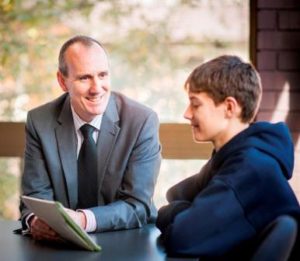
When a school Principal says well-being is just as important as numeracy and literacy in his school, it’s reasonable to question whether that kind of ideology will work in practice.
In the case of Mount Barker High School, judging by its performance at the Brand South Australia Regional Awards, the answer is a resounding yes.
After winning a Flinders University sponsored Education Award, and finishing a runner-up in the Health Award, Principal Warren Symonds is understandably excited at the success of his school’s (now awarding winning) Positive Psychology approach to education.
“This award is an acknowledgement from the community that our approach is valuable and that it improves their health and wellbeing,” Mr Symonds said.
“It’s very reassuring to know that the community is backing what we are doing in the school.”
The field of Positive Psychology is, according to Pennsylvania State University’s Positive Psychology Center website, “the scientific study of the strengths and virtues that enable individuals and communities to thrive”.
The website goes on to say that the field is founded on the belief that people, “want to lead meaningful and fulfilling lives, to cultivate what is best within themselves, and to enhance their experiences of love, work, and play”.
Pennsylvania State psychologist Dr Martin Seligman, who is one of the foremost proponents of the approach globally, was engaged by the South Australian Government’s Thinkers in Residence program to work with Mr Symonds on implementing Positive Psychology principles throughout his school.
According to Mr Symonds, that was the beginning of a process which has changed the ‘DNA’ of his school in ways he can prove are making his students and staff happier.
“Due to our exposure to Dr Seligman, we have used his frame work,” he said.
“We haven’t changed the content of what we teach but it’s a complete change in practice and we’ve embedded it in as many ways as possible.
“Martin Seligman’s approach is cutting edge. No one in the world has embedded it like we have, and other countries are looking at what we are doing and seeing how it’s running.
“It’s about changing the DNA of the school. I didn’t want a ‘program’ because a program is only as good and only lasts as long as the program itself.
“Changing the DNA of the school means it becomes a part of teaching, learning and general culture of the school, so it’s more than a program, it’s an integral part of everything else.”
So successful has the approach been that Mr Symonds has been able to bring all of the local primary schools on board – and even the local council has been getting involved.
“I thought if we just focused at the high school we would only be getting the older children, so I invited all of our primary schools to participate,” he said.
“We have had a 100 per cent take-up rate from those nine schools and we’ve had a lot of buy-in from the local council too.
“I’ve been able to fund over 150 staff members in the Adelaide Hills to be trained through Geelong Grammar in their Positive Psychology approach and we’ve reached 3,000 students up to Year 12 so far.”
So what does embedding Positive Psychology at Mount Barker High School actually look like?
“In Year Eight poetry, for example, we teach how to write a poem about optimism by showing the students a range of optimistic pictures, other poems etc,” Mr Symonds said. “Then they list all of the optimistic words they can think of and use them to write the poem.
“Then they go to art class and paint a picture that matches their poem too.”
And what do the students think of it?
“We’ve got our exiting year 12 students, who have been here for five years, and we have been exit interviewing them and asking them questions about what the school was like before and after,” he said.
“They are saying there’s a significant difference in the strength of the relationships between students and staff and between students and the local community.
“Students are also reporting more authentic and effective student voice within the school, and lots say their commitment and achievements are improved.”
And the staff?
“Staff would say that students are more engaged on the whole, and that the staff’s own behaviour has also improved,” Mr Symonds said.
“We have had 15-20 per cent of staff moving into the ‘flourishing’ category, which in Positive Psychology means they are living within the optimal range of human functioning.”
As an educator with big aspirations for his school and students, Mr Symonds believes it is important that Brand South Australia’s Education Award is sponsored by a higher education institution such as Flinders University.
“I work quite closely with Flinders, particularly with David Giles in the School of Education, and I take my hat off to the University for going out there and doing this,” he said.
“Other universities have not done it, yet Flinders has, which shows the University is genuinely interested in improving education for teachers and students.
“Another organisation could sponsor the award, but because it acknowledges that education outcomes are important, it’s important that tertiary education supports this kind of award.”
Mr Symonds said being recognised in his local community by Brand South Australia was also an important part of promoting quality education in regions.
“Some people would like a state-wide recognition but the benefit of having it in your community is that you are being recognised by your peers,” he said.
“People are seeing excellence in their own back yards. It’s not tall poppy type stuff, but I think it acknowledges excellence in a real community context.”

